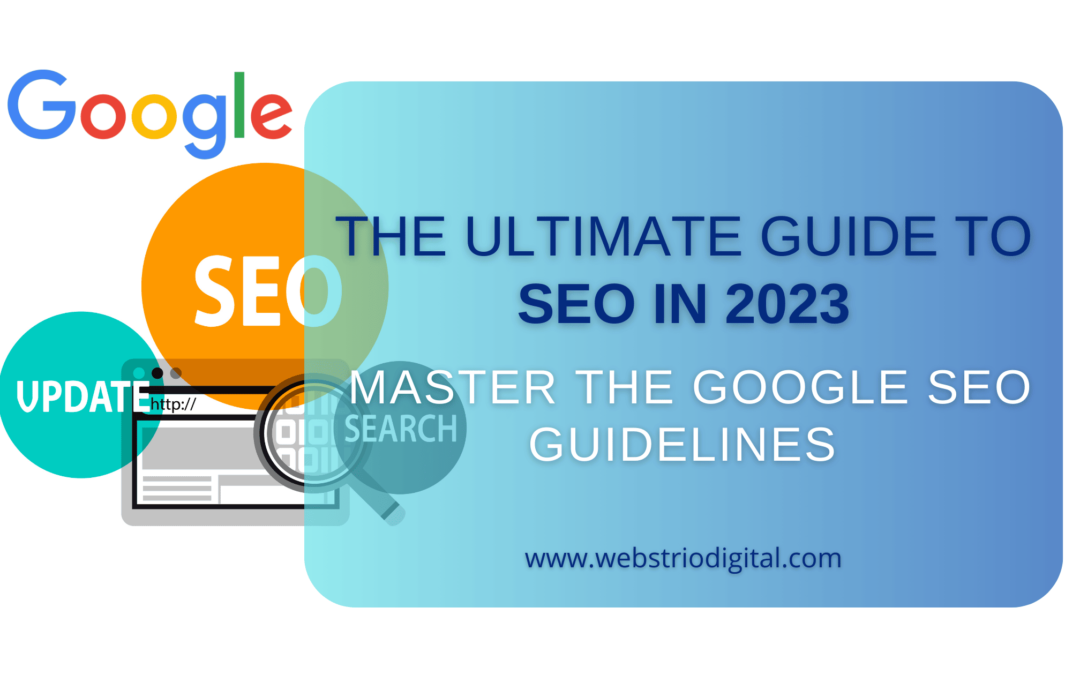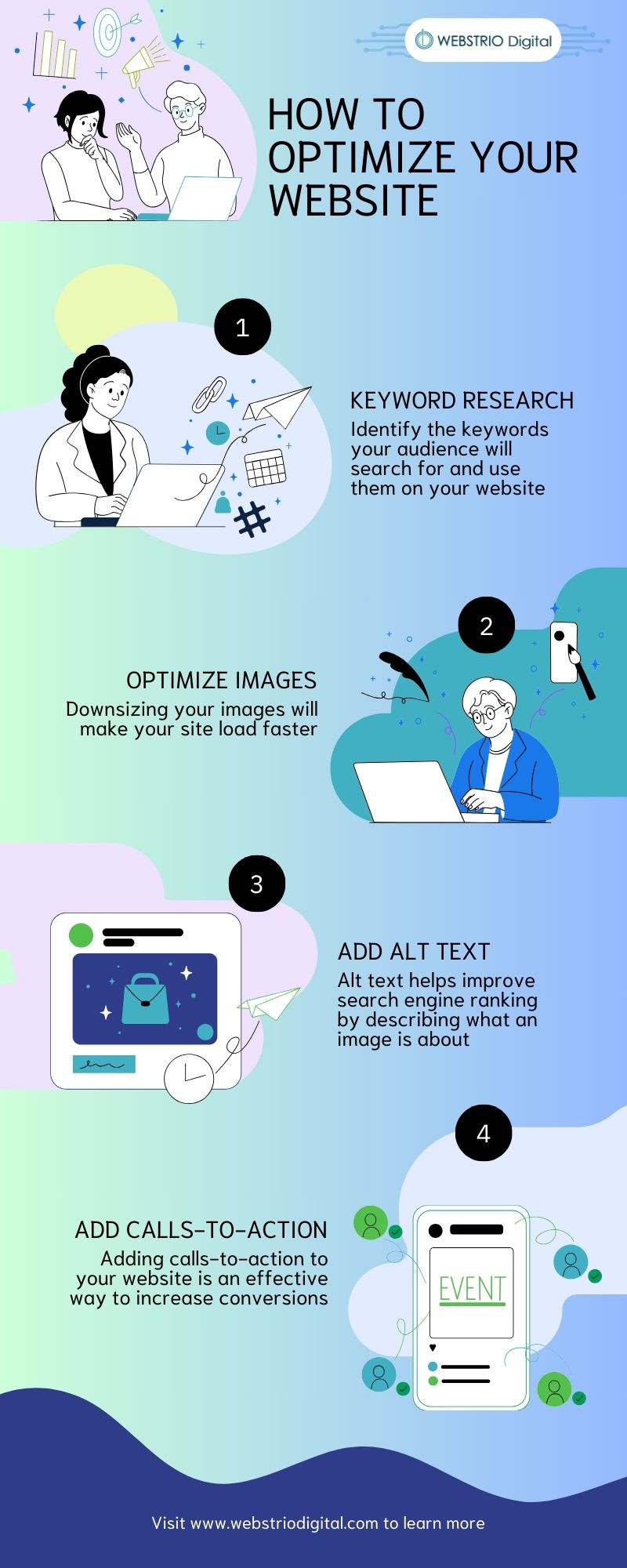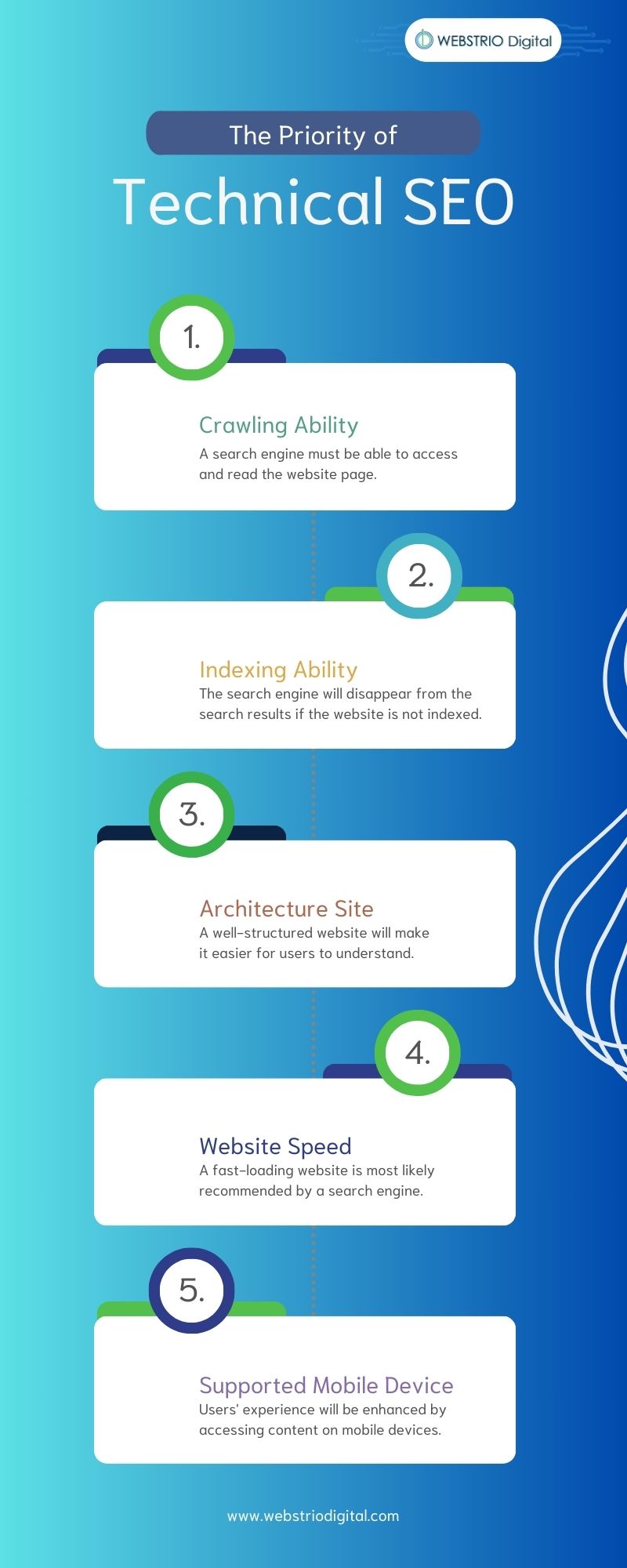Table of Contents
- 1 Introduction to SEO in 2023
- 2 Importance of Following Google SEO Guidelines
- 3 Utilizing User Experience (UX) and Technical SEO
- 4 Understanding the Basics of On-page Optimization
- 5 Mastering Off-page Optimization Strategies
- 6 Optimizing for Voice Search and Mobile Devices
- 7 Keeping up with Algorithm Updates
- 8 Monitoring and Analyzing SEO Performance
- 9 Staying Ahead of the Competition with SEO Tools and Resources
- 10 Conclusion: The Future of SEO and the Importance of Continuous Learning
Introduction to SEO in 2023
Search engine optimization (SEO) is constantly evolving, and staying up-to-date with the latest trends and guidelines is crucial for anyone looking to improve their website’s visibility and rankings on Google. As we approach 2023, it’s important to understand the current landscape of SEO and how to effectively implement strategies that align with Google’s guidelines.
The ultimate guide to SEO in 2023 will provide you with a comprehensive overview of technical SEO, on-page SEO, and off-page SEO techniques that can be used to optimize your website and drive organic traffic.
Whether you’re a beginner or an experienced marketer, this guide will equip you with the knowledge and tools to master the ever-changing world of SEO and achieve success in the digital landscape.
Importance of Following Google SEO Guidelines
The Ultimate Guide to SEO in 2023
Following Google SEO guidelines is paramount for the success of your website in 2023. Google is the dominant search engine, and adhering to its guidelines ensures that your website is optimized to meet its ranking criteria.
First and foremost, complying with Google’s guidelines helps to build credibility and trust. Google constantly updates its algorithms to provide users with the most relevant and high-quality search results. By following these guidelines, you are signaling to Google that your website is trustworthy and provides value to users.
Moreover, adherence to Google’s guidelines improves the user experience on your website. The guidelines focus on factors like mobile-friendliness, page speed, and easy navigation, all of which enhance the overall user experience. A positive user experience not only encourages users to stay longer on your site but also increases the chances of them converting into customers or taking desired actions.
Lastly, following Google’s guidelines helps to future-proof your website. As SEO evolves, Google may penalize sites that employ outdated or black-hat SEO techniques. By staying up-to-date with the guidelines, you can mitigate the risk of penalties and ensure the long-term success of your website.
Next, we will delve into the user experience (UX) and discuss its importance in SEO, and provide tips on how to create a website that engages users and keeps them coming back for more.
We will also discuss about the technical aspects of SEO and explore the key areas you need to focus on to optimize your website according to Google’s guidelines and we will also explore the importance of technical SEO and how to optimize your website’s technical aspects for improved rankings.
Utilizing User Experience (UX) and Technical SEO
Enhancing SEO User Experience in 2023 Through the Power of Infographics in Content
User experience (UX) and technical SEO are two essential aspects of optimizing your website for search engines. While content may be king, the overall user experience and the technical aspects of your website play a crucial role in determining your rankings.
Firstly, user experience refers to how users interact with your website. Google places a lot of importance on delivering a positive user experience, so optimizing your website accordingly is vital. Ensure that your site is easy to navigate, loads quickly, and is mobile-friendly. Additionally, focus on providing high-quality and relevant content that meets the users’ search intent.
Secondly, technical SEO involves optimizing the technical elements of your website to improve its crawlability and indexing. This includes optimizing your site’s structure, ensuring proper URL structure, implementing schema markup, and optimizing meta tags and headers.
By optimizing these technical aspects, you make it easier for search engines to access and understand your website.
Incorporating UX and technical SEO into your overall SEO strategy will not only improve your website’s visibility in search engine results but also provide a better experience for your users.
In the next section, we will discuss about On-page optimization and the importance of keyword research and how to effectively incorporate keywords into your website’s content.
Understanding the Basics of On-page Optimization
On-page optimization is a fundamental aspect of SEO that plays a crucial role in improving your website’s visibility on search engines. In this section, we will dive into the key factors you need to consider for effective on-page optimization.
-
Keyword Research:
Choosing the right keywords is essential for optimizing your website. Conduct thorough keyword research to identify the terms and phrases that your target audience is searching for. Focus on long-tail keywords that have lower competition but higher relevance to your content.
-
Title Tags and Meta Descriptions:
Craft compelling title tags and meta descriptions that accurately describe the content of each page. Include relevant keywords naturally in these elements to improve your website’s click-through rate in search engine results pages.
-
URL Structure:
Optimize your URLs by making them concise, descriptive, and keyword-rich. Use hyphens to separate words in the URL, and avoid using numbers or vague identifiers.
-
Heading Tags:
Utilize heading tags (H1 to H6) to structure your content and make it more readable. Include your main keyword in the H1 tag, and use relevant keywords in the subsequent heading tags to provide clarity and improve user experience.
-
Optimized Content:
Create high-quality, informative, and engaging content that incorporates your target keywords naturally. Optimize your content by including relevant headers, bullet points, and internal links to enhance readability and improve search engine rankings.
Remember, on-page optimization is a continuous process. Regularly review and update your content to ensure it remains relevant and aligns with Google’s guidelines.
We will now discuss the importance of off-page optimization and how to effectively implement it to boost your website’s SEO.
Mastering Off-page Optimization Strategies
Off-page optimization is another crucial aspect of SEO that cannot be overlooked if you want to master Google’s guidelines and improve your website’s rankings. While on-page optimization focuses on improving your website’s structure and content, off-page optimization revolves around building your website’s authority and reputation through external sources.
-
Backlink Building:
One of the most vital off-page optimization strategies is building high-quality backlinks. These are incoming links from other websites that indicate to search engines that your website is trustworthy and credible.
Focus on acquiring backlinks from reputable and relevant websites in your industry. You can do this through guest blogging, partnering with influencers, or creating shareable content that naturally attracts links.
-
Social Media Visibility:
Establish a strong presence across various social media platforms. Engage with your audience, share valuable content, and encourage social sharing.
Social media signals play a role in search engine rankings, so make sure your profiles are optimized with relevant keywords and include links back to your website.
-
Online Reputation Management:
Monitor your online reputation and actively manage it. Engage with customer reviews and respond promptly and professionally.
Positive reviews and ratings can boost your website’s credibility while negative feedback can harm your online presence. Regularly check review sites, social media mentions, and industry forums to maintain a positive online reputation.
-
Influencer Marketing:
Collaborate with influencers in your industry to expand your reach and gain exposure. Influencers have a dedicated following and can help promote your brand, products, or services to a wider audience. Look for influencers who align with your brand values, and create meaningful partnerships that provide mutual benefits.
Remember, off-page optimization takes time and effort. Consistently monitor and refine your strategies to ensure your website’s SEO success.
Optimizing for Voice Search and Mobile Devices
With the rise of virtual assistants like Siri, Google Assistant, and Alexa, optimizing your website for voice search has become crucial in the SEO landscape.
As more users rely on voice commands to search the internet, it’s essential to ensure your website is voice-search friendly.
Start by understanding the intent behind voice queries and optimizing your content accordingly. Focus on long-tail keywords and natural language to match the way people ask questions verbally.
Additionally, mobile optimization plays a significant role in SEO. As the majority of internet traffic comes from mobile devices, Google prioritizes mobile-friendly websites in its search results.
Make sure your website is responsive, loads quickly, and offers a seamless user experience across all devices. Pay attention to factors like easy navigation, clear text, and mobile-friendly design to enhance your website’s visibility and ranking.
Keeping up with Algorithm Updates
In the constantly evolving world of SEO, staying on top of algorithm updates is crucial to maintaining your website’s ranking and visibility.
Google, as the leading search engine, regularly updates its algorithms to provide users with the most relevant and high-quality search results.
As a website owner or SEO professional, it’s essential to be aware of these updates and make the necessary adjustments to your SEO strategy.
Google’s algorithm updates can have a significant impact on your website’s ranking. It’s essential to understand how these updates work and what they prioritize in terms of ranking factors.
Some updates may focus on the quality and relevance of content, while others may emphasize the importance of mobile optimization or user experience.
To keep up with algorithm updates, follow reputable SEO blogs and industry experts who provide in-depth analysis and insights. Stay informed about any upcoming updates and how they may affect your website’s SEO.
Regularly monitor your website’s performance and make adaptations accordingly to ensure your SEO strategy remains effective.
In the next section, we will explore the significance of backlinks in SEO and how to build a strong and authoritative link profile for your website.
Monitoring and Analyzing SEO Performance
Once you have implemented user experience (UX) and technical SEO strategies, it is important to monitor and analyze the performance of your SEO efforts. This will help you identify what is working well and what areas need improvement.
To effectively monitor your SEO performance, you can use various tools like Google Analytics and Google Search Console. These tools provide valuable data on the number of visitors to your website, the keywords they used to find your site, and the pages they visited.
By analyzing this data, you can gain insights into which keywords are driving traffic to your site and which pages are performing well. This information can help you make informed decisions on how to optimize your website further.
Additionally, monitoring your SEO performance allows you to identify any issues or errors that may be affecting your rankings. For example, if you notice a sudden drop in organic traffic, you can investigate and address any potential issues promptly.
Regularly monitoring and analyzing SEO performance is crucial to keep your website optimized and ensure that it continues to rank well on search engine results pages.
In the next section, we will explore the importance of link building and how to create a strong backlink profile. Stay tuned for more SEO strategies and tips!
Staying Ahead of the Competition with SEO Tools and Resources
In the fast-paced world of SEO, staying ahead of the competition is essential to maintaining a strong online presence. Thankfully, there are a plethora of SEO tools and resources available to help you achieve this.
One such tool is SEMrush, a comprehensive SEO software that allows you to analyze your competitors’ websites, track their keywords, and gain valuable insights into their strategies. By understanding what tactics are working for your competitors, you can adapt and optimize your own SEO efforts accordingly.
Another useful resource is Moz’s Link Explorer, which helps you uncover opportunities for link building by analyzing your competitors’ backlink profiles. By identifying the websites that are linking to your competition, you can reach out to them and secure high-quality backlinks for your own site.
Additionally, industry-specific forums and communities are great places to network with fellow SEO professionals and stay up to date with the latest trends and strategies. Sites like Reddit and Quora can provide valuable insights and opportunities for collaboration.
By utilizing these tools and resources, you can gain a competitive edge and ensure that your SEO efforts are always one step ahead. In the next section, we will delve into the world of content creation and discuss how to optimize your website’s content for SEO success. Stay tuned for more valuable tips and strategies to master Google’s SEO guidelines in 2023.
Conclusion: The Future of SEO and the Importance of Continuous Learning
As we wrap up our ultimate guide to SEO in 2023, it’s important to emphasize the future of SEO and the significance of continuous learning in this ever-evolving industry. Google’s algorithms and guidelines will continue to change and update, making it crucial for SEO professionals to stay informed and adapt their strategies accordingly.
One key aspect to keep in mind is the growing importance of user experience in SEO rankings. Google is increasingly prioritizing websites that provide a seamless and relevant user experience, so optimizing your site for speed, mobile-friendliness, and intuitive navigation is essential.
Furthermore, voice search is on the rise, with more and more people using devices like smart speakers and virtual assistants to search the web. As a result, optimizing your content for voice search queries, using long-tail keywords and natural language, will become increasingly important in the years to come.
Lastly, continuous learning is crucial. As new SEO techniques and strategies emerge, it’s important to stay up to date and adapt your approach accordingly. Follow industry-leading blogs, attend webinars and conferences, and engage with other SEO professionals to stay informed and ahead of the curve.
By combining these techniques, staying informed about Google’s SEO guidelines, and adapting your strategies as necessary, you can master the art of SEO and achieve lasting success in the digital landscape.
Thank you for taking the time to explore “The Ultimate Guide to SEO in 2023“, If you have any queries or need any Website SEO consultation, please feel free to contact our team at WEBSTRIO Digital – Leading SEO Company in India is here to assist you.
Our Indian SEO Company Contact:
Email: info@webstrio.com | Phone/WhatsApp: +91 9188051255
Author Profile

- Vibhu, an esteemed SEO expert in Kerala, India, boasts over 9+ years of invaluable experience in the digital realm. Having embarked on his entrepreneurial journey after leaving the corporate sphere, Vibhu's passion for Search Engine Optimization, SEO friendly web development, and design fueled the establishment of his own digital marketing and SEO company in Kerala, India. Currently serving as the Chief Executive Officer of WEBSTRIO Digital, WEBSTRIO Hostings, and WEBSTRIO Technologies, Vibhu's expertise extends across the domains of digital marketing, web hosting, and technology. Holding a degree in Electrical and Electronics Engineering and a background as a BMS Engineer, Vibhu brings a diverse skill set and a wealth of knowledge to the forefront of the ever-evolving SEO landscape in Kerala.
Latest entries
- September 15, 2025search engine optimization (seo)Discover the Secrets to Online Success with Top-rated SEO Experts in Kerala!
- August 5, 2025search engine optimization (seo)How Much Does SEO Cost for a Small Business in India?
- November 30, 2023best seo company in calicutWEBSTRIO Digital- Best SEO Company in Calicut. Why SEO is Important
- November 27, 2023search Engine Optimization ServicesWhat are SEO Services? How to Boost Online Visibility with SEO Services




Recent Comments